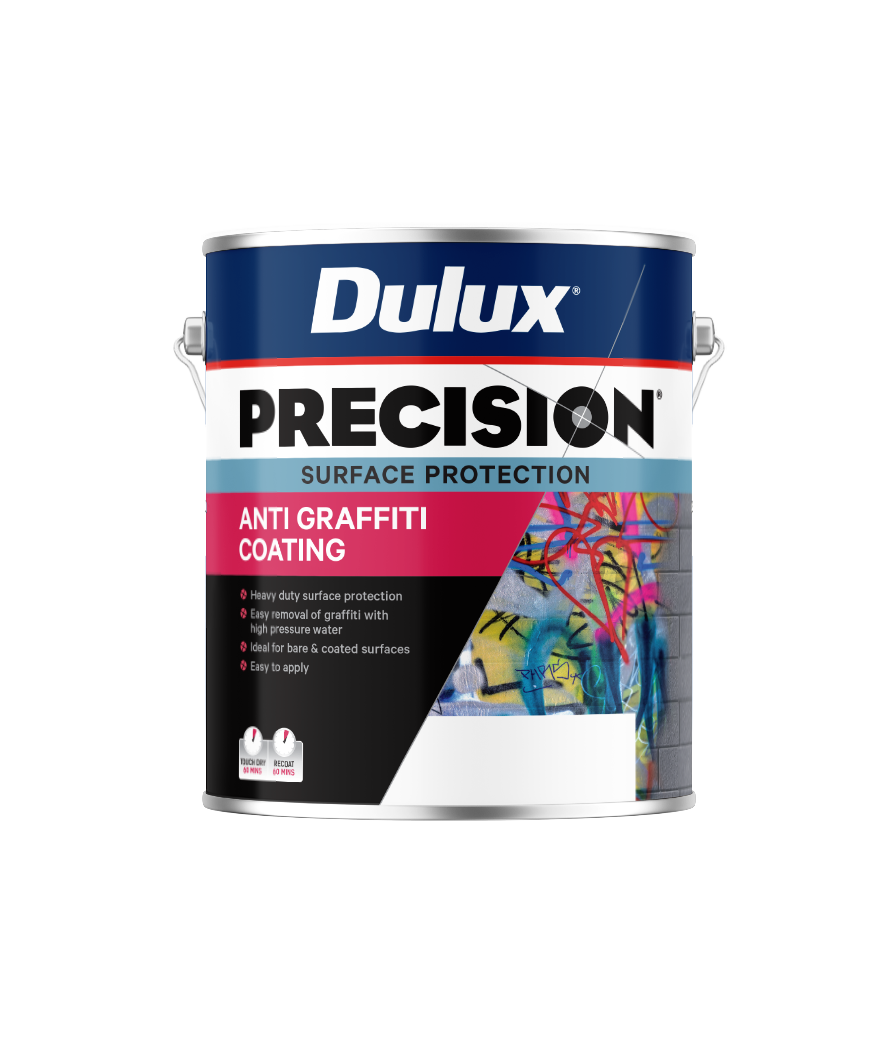
About PRECISION® Anti Graffiti Coating
Safeguard the appearance of your home with Dulux PRECISION® Anti Graffiti, a heavy duty coating that can provide long-term protection to a range of bare and painted surfaces. Only high-pressure water is required to easily remove aerosol paint-based graffiti from surfaces protected with PRECISION® Anti Graffiti enabling you save on costs associated with repainting or removing graffiti.
Downloads
Application
At a glance
- Ideal for bare and coated surfaces
- Save on costs associated with removing graffiti or repainting
- Does not require a professional painter
- Superior protection from graffiti
Areas to use
Performance guide
Interior and exterior use on a variety of bare and painted surfaces including, timber, concrete, brick, render, metal, glass, painted uPVC only, powder coated.
Surfaces
Use on interior & spot exterior surfaces including:
• Paper-faced plasterboard
• Timber
• MDF
• Chipboard
• Plywood
• Aged enamel
• Brick
• Render
• Masonry
• Concrete
• Cement sheet
• Cladding
• Previously painted surfaces and suitably primed steel
Previously Painted Surfaces
Surface preparation: ensure all surfaces are clean and dry prior to application.
Brush down to remove dust.
Previously painted surfaces:
• Good condition: Dust, then clean with Selleys® Sugar Soap and rinse thoroughly.
• Cracked or peeling: Remove paint completely.
• Wash down with Selleys® Sugar Soap and rinse thoroughly.
• Gloss surface Apply one coat of Dulux PRECISION® Anti Graffiti Wash Primer.
Unpainted Surfaces
Test in an inconspicuous area first.
• For advice on how to reduce this effect, contact Dulux Help & Advice.
• The surface must be dry and free from contaminants including grease, oil, dirt and other loosely adhering materials.
Brick, concrete, cement sheet, render:
Fill holes and other imperfections with a suitable filler, sand and dust off.
Allow cement render and concrete to properly cure before painting.
Timber: Sand bare timber to a clean surface and dust down.
Fill nail holes and cracks with suitable filler, then sand smooth and dust off.
Metal, glass, powder coated: Apply one coat of Dulux PRECISION® Anti Graffiti Wash Primer.
Unpainted surfaces Warning: This is a permanent coating on bare/unpainted surfaces.
If you wish to remove coating at a later date, you will need to apply a paint layer first.
This coating creates a wet look on uncoated surfaces.
Brush, roller
1. Protect all adjoining surfaces from overspray.
2. Shake the can well for at least one minute after the ball starts to move before use and regularly during use.
3. Lower temperatures and high humidity will slow the drying speed.
4. Avoid spraying when air or surface temperature is below 10°C or above 35°C.
5. To ensure surface compatibility, test spray on an inconspicuous area.
6. Spray application:
7. Hold can upright 15 to 25cm from the surface.
8. Spray horizontally with smooth, even strokes parallel to the surface.
9. Apply several light mist coats, wet on wet, rather than one heavy coat which may cause paint dripping or sagging.
Unused paint
Do not pour leftover paint down the drain.
Unwanted paint should be brushed out on newspaper and allowed to dry, and then disposed of via domestic waste collections.
For more information on responsible disposal of paint and packaging visit painttakeback.co.nz or paintback.com.au.
Empty paint containers
Leave empty paint containers open in a well-ventilated area to dry out. When dry, recycle the container via steel can recycling programs.
Disposal of empty paint containers via domestic recycling programs may differ between local authorities. Check with your local council first.
Do not reuse container unless thoroughly decontaminated.
For more information on responsible disposal of paint and packaging visit paintback.com.au or painttakeback.co.nz
PRECISION® Anti Graffiti Coating
Services and support
Make confident decisions about your project needs with support from our wide network of colour and product specialists, tools, programs and apps — or chat to one of our expert consultants now.

Dulux Colour Consultant
Imagining how a space will feel in a new colour scheme is hard. Save time and gain colour confidence the smart way with personal guidance from an expert Dulux Colour Consultant.
Learn more-->Help and advice
Our expert support team can help with everything from choosing colour, what product is the most appropriate for your job or troubleshooting when something hasn’t gone your way.
Find help and advice-->
